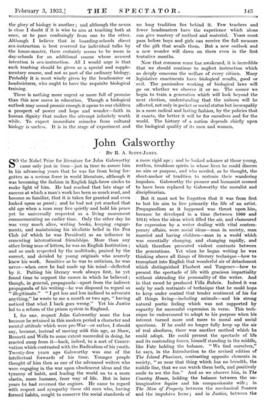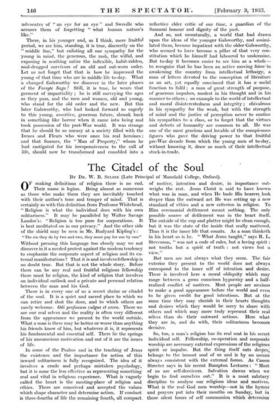John Gals worthy
By R. A. SCOTT-JAMES.
S0 the Nobel Prize for literature for John Galsworthy came only just in time—just in time to assure him in his advancing years that he was far from being for- gotten as a serious force in world literature, although it was becoming the fashion in English high-brow circles to make light of him. He had reached that late stage of success at which a man's work has been so much read, and become so familiar, that it is taken for granted and even looked upon as passé; and he had not yet reached that old age when a man may live quietly and hold his peace yet be universally respected as a living monument commemorating an earlier time. Only the other day he was very much alive, writing books, keeping engage- ments, and maintaining his idealistic belief in the Pen Club (of which he was President) as an influence in cementing international friendships. More- than any ether living man of letters, he was an English Institution ; and as such respected by the multitude, praised by the correct, and derided by young originals who scarcely knew his work. Sensitive as he was to criticism, he was never—when once he had made up his mind—deflected by it. Putting his literary work always first, he yet found time to support the causes in which he believed ; though, in general, propaganda—apart from the indirect propaganda of his writing=he was disposed to regard as "illegitimate.". " I get less and less inclined to advocate anything," he wrote to me a month or two ago, " having noticed that what I back goes wrong." Yet his Justice led to a reform of the prison system in England.
I, for one, respect John Galsworthy none the less because he,retained in this modern period a character and mental attitude which were pre-War—or rather, I should say, because, instead of moving with this age, as Shaw, Bennett and Wells to some extent succeeded in doing, he reacted away from it—back, indeed, to a sort of Conser- vatism which contrasted with the Radicalism of his youth. Twenty-five years ago Galsworthy was one of the intellectual forwards of his time. Younger people thought of him then as one of the advanced writers who were engaging in the war upon obsolescent ideas and the tyranny of habit, and leading the world on to a more elastic, more humane, freer way of life. But in later years he had reversed the engines. He came to regard with respect and sympathy those old men who, having formed habits, sought to conserve the social standards of
a more rigid age ; and he looked askance at those young, restless, troublous spirits in whose lives he could discern no aim or purpose, and who needed, as he thought, the sheet-anchor of tradition to restrain their wandering impulses. Galsworthy the pioneer and humanist seemed to have been replaced by Galsworthy the moralist and disciplinarian.
• But it must not be forgotten that it was from first to last his aim to live primarily the life of an artist. Propagandism as it happened was thrust upon him, because he developed in a time (between 1900 and 1914) when the ideas which filled the air, and clamoured for expression by a writer dealing with vital contem- porary affairs, were social ideas—man in society, man married and having children—man in a world which was essentially changing, and changing rapidly, and which therefore presented violent contrasts between the generations. Yet when lie began writing he was thinking above all things of literary technique—how to transplant into English that wonderful air of detachment which distinguished Flaubert and Turgenev—how to present the spectacle of life with gracious impartiality without obtruding the personality of the writer. And in that mood he produced Villa Rubein. Indeed it was only by such restraints of technique that he could hope to keep under control that tender sentiment of his for all things living—including animals—and his strong natural poetic feeling which was not supported by capacity for successful expression in verse. This tech- nique he endeavoured to adapt to his purpose when his interest turned more and more to moral and social questions. If he could no longer fully keep up the air of real aloofness, there was another method which he could adopt. He could present the spectacle of life and its contending forces, himself standing in the middle, like Fate holding the balance. " We find ourselves," he says, in the Introduction to the revised edition of The Island Pharisees, contrasting opposite elements in society, " so near that thing which has no breadth, the middle line, that we can watch them both, and positively smile to see the fun." And so we observe him, in The Country House,. holding the balance between the un- imaginative Squire and his compassionate wife ; in The Man of Property between the mechanical Soames and the impulsive Irene ; and in Justice, between the
advocates of " an eye for an eye " and Sweedle who accuses them of forgetting " what human nature's like."
There, in his younger and, as I think, more fruitful period, we see him, standing, it is true, discreetly on the " middle line," but enlisting all our sympathy for the young in mind, the generous, the rash, the wilful, and exposing in scathing satire the inflexible, habit-ridden, soul-drugged survivors of an old and out-worn order. Let us not forget that that is how he impressed the young of that time who are in middle life to-day. What a changed Galsworthy we discover in the later phases of the Forst Saga ! Still, it is true, he wears that garment of impartiality ; he is still surveying the ages as they pass, and the men and women, old and young, who stand for the old order and the new. But this later Galsworthy, who had looked forward so eagerly to this young, assertive, generous future, shrank back in something like horror when it came into being and took possession of the post-War world. It was strange that he should be so uneasy at a society filled with the Irenes and Fleurs who were once his real heroines ; and that Soames, the " Man of Property," whom he had castigated for his irresponsiveness to the call of life, should now be transformed and ennobled into a reflective elder' critic of our time, a guardian of the Samurai honour and dignity of the past.
And so, not unnaturally, a world that had drawn upon the ideas of the younger Galsworthy, and assimi- lated them, became impatient with the older Galsworthy, who seemed to have become a pillar of that very con- stitution which he himself had laboured to undermine. But to-day it becomes easier to see him as a whole— to recognise that lie has been an active moving Wive in awakening the country from intellectual lethargy; a man of letters devoted to the conception of litho:hire as an art, yet equally convinced that it has a, sodial function to fulfil ; a man of great strength of purpose, of generous impulses, modest in his thought and in his manner to others ; an example to the world of intellectual and moral disinterestedness and integrity ; chivalrous in his sympathy for the weak, but with the strength of mind and the justice of perception never to confine his sympathies to a class, or to forget that the virtues and defects of humanity are common to all. He was one of the most gracious and lovable of the conspicuous figures who gave the driving power to that fruitful pre-War decade from which the young men of to-day, without knowing it, draw so much of their intellectual stock-in-trade.





































 Previous page
Previous page